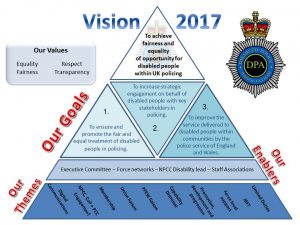 In the private sector, employee support networks have gained a lot of traction as a resource that is being valued highly for its positive contributions by major banks and other areas of industry, often supplementing the professional support of HR departments.
In the private sector, employee support networks have gained a lot of traction as a resource that is being valued highly for its positive contributions by major banks and other areas of industry, often supplementing the professional support of HR departments.
Employee support networks are a huge asset to policing too, for many many reasons, but there is just one I am going to focus on in this article: The power of Peer support.
Disabled officers and staff, those caring for family, even those who just have a friend or family member who have a disability or an illness are welcome to join a disability support network in their force. All have much to benefit from disability support networks locally and nationally.
In difficult times most of us will struggle to find someone who truly understands what we are going through. Family and friends can be a huge help, supportive and comforting, but often they don’t truly get where you are coming from. This is not their fault, policing is such a unique profession and when you mix in the need to manage a disability, you can see how hard it is for them to truly understand your position.
There are now many support groups on line, especially on social networking sites, which offer group support for specific conditions or disabilities. These are great – but there aren’t many people there who understand what it is like to be a police officer and have a disability.
This is where disability support networks truly benefit policing. Offering advice, raising awareness, peer support and even mediation with the employer, resolving issues in the workplace quickly and to mutual benefit to both employee and employer. This ensures the needs of both are considered, in turn improving the service given to the public.
So why is it some forces do not have a disability support network?
Recently I became aware of an inspirational example to illustrate the very benefits of disability support networks for policing:
Officer X emails the Disabled Police Association a few months ago seeking some advice and support as he is currently off of work due to illness. Unfortunately there is no disability support network in officer X’s force.
The DPA circulated a request for assistance throughout the force networks and so came back an offer of assistance from a neighbouring force – officer Y.
To date officer Y has spent in excess of 50 hours providing telephone support to officer X and sending numerous emails in his own time.
Officer Y even booked a days annual leave to attend officer X’s force to provide support in person at an arranged meeting.
The matters involved are now being resolved following the meeting and officer X has been reassured and feels fairly treated. This is likely to speed up his return to work.
This is just one of the many examples which take place daily where members of (voluntary) disability support networks go above and beyond to support their colleagues. The contribution may not seem much, but when you total up the time spent giving one to one support, you realise just how much of a positive impact this will have had on officer Y’s morale and confidence in policing and managing their disability.
It is really important that I must also stress that ‘V’ word – ‘Voluntary’.
Whilst some hours of support may be given during duty time, for most, the vast majority of support provided is done so when off duty.
A further example demonstrates the possibilities for improving work force management:
Over the last 18 months I have been contacted by officers with the same physical disability as me, or who are waiting to have their operation. All have wanted support as their Occupational health departments have told them they won’t be on operational duties again. I have been able to provide examples, including my own, where adjustments can be made to allow them to continue to do frontline duties, providing examples of specialist personal protective equipment and where forces can purchase them from. Along with another colleague, we have now set up a closed facebook group for people to share their experiences. Without our networks, these officers would likely continue to be told they cannot do frontline operational duties.
I believe it is vital that Chief Officers support the voluntary contributions of their staff – supporting their staff. My goal is to have a disability support network in every force within the next 18-24 months.
Disability staff networks – Recognise it, reward it and reap the benefits!
Jamie Mills
General Secretary
This article represents the personal opinions of the author and is not the ‘official view’ of the DPA


